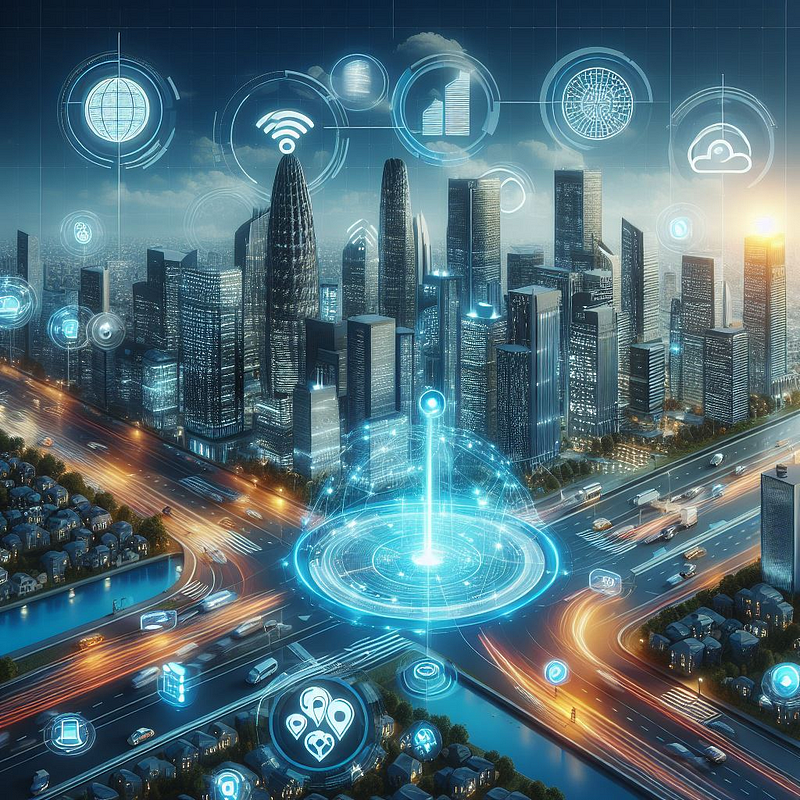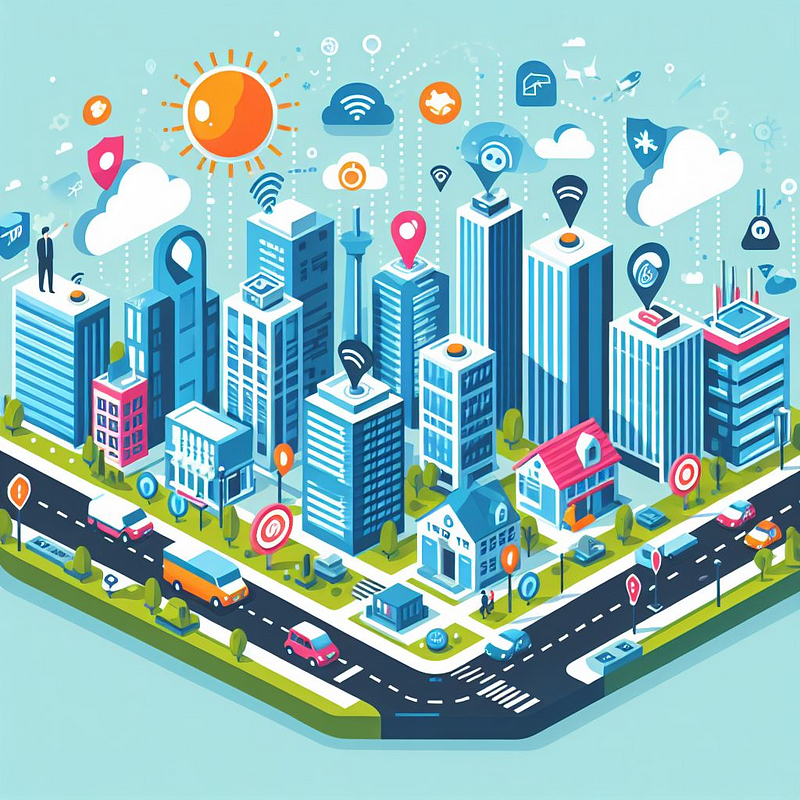Innovating the Future: How IoT App Development Companies Drive Change
Iot Development
The Internet of Things (IoT) is rapidly transforming our world, with a network of interconnected devices generating a wealth of data. This data revolution has profound significance, enabling businesses to optimize operations, personalize user experiences, and even contribute to sustainability efforts. However, harnessing the power of IoT requires user-friendly interfaces, and this is where specialized IoT app development companies step in. They play a crucial role in designing intuitive apps, building secure data handling solutions, and integrating AI for intelligent insights. By bridging the physical and digital divide, these companies are driving innovation and shaping the future of a truly connected world.
The Evolution of IoT Technology
The journey of IoT technology is a fascinating tale of continuous advancement. It all began with the concept of connected devices, with early examples like the invention of the “connected” Coca-Cola vending machine in 1982, allowing users to remotely check its inventory. The term “IoT” gained traction in the early 2000s, and the first IoT conference was held in 2008, marking a turning point.
Over the years, several factors fueled the growth of IoT:
Affordable and miniaturized sensors: Advancements in technology led to the creation of smaller, more cost-effective sensors, making it feasible to embed them in a wider range of devices.
Improved connectivity solutions: The rise of wireless technologies like Bluetooth, Wi-Fi, and cellular networks enabled seamless communication between devices and the internet.
Cloud computing: The emergence of cloud platforms provided efficient storage and processing capabilities for the massive amount of data generated by IoT devices.
Challenges in IoT App Development
While the possibilities of IoT are vast, developing successful IoT applications presents a unique set of challenges for companies venturing into this domain. Unlike traditional software development, the connected nature of IoT necessitates a more complex approach, demanding specialized expertise and resources:
1. Security Concerns: Securing the vast network of interconnected devices and the sensitive data they generate is paramount. Weaknesses can leave systems vulnerable to hacking and data breaches, requiring companies to prioritize robust security measures throughout the development lifecycle.
2. Interoperability Hurdles: The diverse nature of IoT devices often means they utilize different communication protocols and standards.It need to navigate these complexities, ensuring seamless communication and data exchange between disparate devices and platforms.
3. Scalability and Performance: As the number of connected devices explodes, applications must be able to handle the ever-increasing volume of data efficiently. Building scalable and high-performance solutions is crucial to avoid performance bottlenecks and ensure smooth user experiences.
4. Resource Constraints: Many IoT devices operate with limited processing power and battery life. App development companies must design applications that are resource-efficient, optimizing code and minimizing resource consumption without compromising functionality.
The Role of IoT App Development Companies
While the vast potential of the Internet of Things (IoT) is undeniable, translating raw data into actionable insights and creating seamless user experiences requires specialized expertise. This is where IoT app development emerge as the unsung heroes, playing a pivotal role in addressing the key challenges:
1. Bridging the Gap: Transforming raw sensor data into user-friendly interfaces and intuitive applications necessitates expertise in user interface (UI) and user experience (UX) design. These companies excel in creating apps that bridge the gap between the physical world of connected devices and the digital realm of data visualization and user interaction.
2. Building Scalable Solutions: With the ever-growing network of connected devices, the ability to manage the influx of data becomes crucial. IoT app development companies possess the expertise in developing scalable and robust software solutions capable of handling massive data streams efficiently, ensuring the smooth functioning and seamless growth of your connected ecosystem.
3. Prioritizing Security: Security is paramount in the interconnected world of IoT. These companies leverage their in-depth understanding of cybersecurity protocols and best practices to build applications with robust security features, safeguarding sensitive data and protecting user privacy.
4. Optimizing Efficiency: It are adept at optimizing applications for efficiency and performance. They utilize cutting-edge technologies like cloud computing and edge computing to ensure quick response times and seamless data processing, maximizing the effectiveness of your IoT system.
Driving Innovation and Transformation
The impact of extends far beyond simply bridging the gap between devices and users. These companies are at the forefront of driving innovation and transformation across diverse industries:
1. Revolutionizing Healthcare: Imagine wearable devices monitoring vital signs, sending real-time data to physicians, and enabling remote patient monitoring. This is the reality in healthcare, where IoT app development are creating solutions like:
AliveCor: This company’s KardiaMobile ECG app utilizes a smartphone attachment to capture and analyze electrocardiograms, empowering patients to monitor for heart rhythm irregularities.
Dario: This company’s connected glucose meter pairs with a smartphone app, allowing diabetics to track their blood sugar levels, receive personalized insights, and connect with healthcare providers remotely.
2. Transforming Manufacturing: In the world of manufacturing, IoT app development companies are helping to:
Optimize production lines: By leveraging sensor data and predictive analytics, companies can identify potential equipment failures and schedule preventive maintenance, minimizing downtime and maximizing efficiency.
Streamline supply chains: Real-time tracking of goods and materials throughout the supply chain allows for improved inventory management, optimized logistics, and enhanced transparency for all stakeholders.
3. Building Smart Cities: IoT app development are instrumental in creating smarter cities through:
Connected traffic management systems: These systems optimize traffic flow based on real-time data, reducing congestion and improving air quality.
Smart waste management: Sensors on trash bins alert sanitation crews when they need to be emptied, optimizing collection routes and reducing costs.
Ensuring Security and Compliance: A Crucial Responsibility of IoT App
In the interconnected world of the Internet of Things (IoT), where devices collect and transmit vast amounts of data, security and compliance are paramount concerns. While the potential benefits of IoT are undeniable, vulnerabilities in connected systems can pose significant risks to user privacy, data integrity, and even physical safety. This is where IoT app development play a crucial role in ensuring secure and compliant solutions.
The Importance of Security and Compliance:
Data Protection: Breaches in connected systems can expose sensitive user data, leading to financial losses, identity theft, and reputational damage.
Device Integrity: Malicious actors can exploit vulnerabilities to gain control of devices, potentially causing disruptions, physical harm, or even financial losses.
Regulatory Compliance: Various industries and regions have specific regulations governing data privacy and security, and failure to comply can result in hefty fines and legal repercussions.
How IoT App Development Address Security Concerns
Secure Coding Practices: These companies employ secure coding principles and best practices to minimize vulnerabilities in their applications.
Data Encryption: Sensitive data is encrypted both at rest and in transit, protecting it from unauthorized access.
Regular Security Testing: They conduct regular security testing to identify and address potential vulnerabilities before they can be exploited.
Authentication and Authorization: They implement robust authentication and authorization mechanisms to control access to devices and data.
Compliance Expertise: Many companies have dedicated teams with expertise in compliance with relevant regulations and standards like HIPAA, GDPR, and CCPA.
Customization and Tailored Solutions
In a world teeming with diverse businesses and unique challenges, a one-size-fits-all approach rarely yields optimal results. This is particularly true with IoT implementations, where success hinges on customization and tailored solutions. Here’s why IoT app development play a crucial role:
Understanding the Importance of Customization:
Industry-Specific Needs: Different industries have unique data needs and operational workflows. A generic solution wouldn’t capture the nuances of, say, optimizing patient care in healthcare or streamlining production lines in manufacturing.
Integrating with Existing Systems: Businesses often have existing IT infrastructure and software applications. An IoT app development company can seamlessly integrate the new IoT solution with these existing systems, avoiding costly and disruptive overhauls.
Future-Proofing Solutions: Businesses constantly evolve, and their needs change over time. A tailored solution built with scalability and flexibility in mind can adapt to future growth and changing requirements.
How IoT App Development Companies Deliver Customization:
Collaborative Approach: These companies work closely with clients to understand their specific needs, challenges, and goals. This collaborative approach allows them to tailor the solution to address the unique situation.
Domain Expertise: Many companies have dedicated teams with expertise in specific industries, allowing them to develop solutions that are relevant and effective for the client’s business context.
Modular Design Principles: By utilizing modular design principles, developers can create versatile solutions with customizable features and functionalities. This enables businesses to choose the components that best suit their requirements.
Collaboration and Partnership Unlocking the Full Potential of IoT
The journey towards a successful IoT implementation is rarely a solitary one. IoT app thrive on a collaborative approach, working closely with clients to understand their specific needs and goals. This partnership approach fosters a deeper understanding of the business landscape, leading to the development of tailored solutions that maximize the potential of the technology.
Benefits of Collaborative Partnerships with IoT App Development Companies:
Shared Expertise: By combining the client’s industry knowledge with the developer’s technical expertise, the partnership unlocks a wealth of knowledge and experience, leading to more effective solutions.
Faster Time to Market: Through collaboration, important decisions can be made efficiently, allowing for a faster development and deployment process. This enables businesses to capitalize on emerging market opportunities and gain a competitive edge.
Reduced Risks: Working closely with the development team allows for continuous feedback and iterative development. This collaborative approach helps to identify and address potential issues early on, minimizing risks associated with the project.
Long-Term Success: By fostering a strong partnership built on trust and communication, both parties are invested in the long-term success of the IoT solution. This ensures ongoing support and maintenance, allowing the system to adapt and evolve alongside the client’s business needs.
Future Trends and Opportunities
Emerging Trends in IoT Technology:
Edge Computing: Processing data closer to its source, at the “edge” of the network, will enable faster response times, improved privacy, and reduced reliance on centralized cloud infrastructure.
Artificial Intelligence (AI) and Machine Learning (ML): Integrating AI and ML into IoT applications will enable advanced analytics, predictive maintenance, and intelligent automation, leading to greater efficiency and cost savings.
Low-Power Wide Area Networks (LPWAN): These networks offer long-range connectivity for battery-powered devices, expanding the reach of IoT solutions to previously inaccessible areas.
Blockchain Technology: Blockchain can enhance security and trust in IoT systems by providing a tamper-proof record of data transactions.
Impact of these Trends on Industries:
Manufacturing: Predictive maintenance based on real-time sensor data will minimize downtime, while AI-powered robots will revolutionize production lines.
Healthcare: Remote patient monitoring and personalized medicine facilitated by IoT will improve healthcare accessibility and quality.
Smart Cities: Real-time traffic management and intelligent resource allocation will optimize urban operations and enhance sustainability.
Opportunities for Growth in IoT App Development:
These trends present a vast landscape of opportunities for IoT app development to:
Develop innovative solutions that leverage cutting-edge technologies like AI and edge computing.
Expand into new industry verticals where IoT is poised for significant growth, such as agriculture and environmental monitoring.
Focus on niche markets and cater to the specific needs of specialized applications.
Refine their expertise in data security and privacy to meet the evolving regulatory landscape.

